Reinforce your understanding of LPN/LVN nursing skills — and prepare for the NCLEX-PN® exam! Corresponding to the chapters in Foundations of Nursing, 9th Edition, this study guide provides a variety of exercises to help you review, practice, and apply nursing concepts and principles. Review questions make it easier to achieve the chapter objectives from the textbook, and critical thinking activities help you develop clinical judgment skills. Now with Next Generation NCLEX® (NGN)-style case studies and questions, this guide provides you with an effective study tool for the NGN exam.
Study Guide for Foundations of Nursing, 9th Edition
KSh 7,280.00
Reinforce your understanding of LPN/LVN nursing skills — and prepare for the NCLEX-PN® exam! Corresponding to the chapters in Foundations of Nursing, 9th Edition, this study guide provides a variety of exercises to help you review, practice, and apply nursing concepts and principles. Review questions make it easier to achieve the chapter objectives from the textbook, and critical thinking activities help you develop clinical judgment skills. Now with Next Generation NCLEX® (NGN)-style case studies and questions, this guide provides you with an effective study tool for the NGN exam.
2 in stock
Related products
-
Applying the Nursing Process: A Tool for Critical Thinking 7th Edition
KSh 17,850.00Enhance clinical judgment with Applying the Nursing Process: A Tool for Critical Thinking, 7th Edition. Learn step-by-step assessment, planning, and evaluation skills for effective patient care.
This trusted resource combines the practical guidance students need to understand each phase of the nursing process with an emphasis on critical thinking, focusing on both independent and collaborative responsibilities facing today’s nurses. Using straightforward language, abundant examples, and real case scenarios, the book addresses the nurse’s role as a caregiver and decision-maker in a range of settingsfrom clinic to the home, community, research, and acute care arenas. A new focus and design help readers build essential critical thinking and problem solving skills and apply them within the nursing process framework.
A companion Website provides a variety of tools such as patient self-assessment tool, clinical decision map, NCLEX® resources, and much more.
-
Children with Developmental Disabilities: A Training Guide for Parents, Teachers and Caregivers First Edition
KSh 6,370.00This manual is designed as a guide for parents, teachers and caregivers dealing with children up to the age of six who are afflicted by developmental disabilities. The author provides details of more than 400 non-formal activities along with guidelines on how to use them both at home and in pre-school settings.
The book is divided into three sections:
– the first describes a wide range of impairments, disabilities and handicaps along with information on their manifestations and characteristics. The author also outlines steps to handle negative or problem behaviour during training.
– the next section presents a Comprehensive Activity Checklist for pre-school children. All items have been empirically tested and are located on a scale of increasing difficulty.
– the third section comprises two chapters. The first is a `do-it-yourself` activity assistance guide which will be of immense use to trainers, caregivers, teachers and parents. In the last chapter, Dr Venkatesan discusses contemporary problems and issues related to the rights and privileges of persons with developmental disabilities -
Critical Care Nursing: Diagnosis and Management 8th Edition by Linda D. Urden
Get a firm understanding and mastery of the unique issues and procedures involved in critical care nursing with Critical Care Nursing: Diagnosis and Management, 8th Edition. Praised for its comprehensive coverage and clear organization, this market-leading text offers a great foundation in the realities and challenges of today’s critical care unit that’s perfect for both nursing students and practicing nurses alike. This new edition also features enhanced integration of QSEN and interprofessional collaborative practice, plus expanded coverage of leadership, post-ICU outcomes and highly contagious infections. Revamped case studies, Patient Teaching boxes, Evidence-Based Practice boxes, Patient Safety Alerts, and other learning tools further develop your critical thinking skills and prepare you for success in high-acuity, progressive, and critical care settings.
UNIQUE! Nursing management plans of care feature approximately 35 NANDA-I nursing diagnoses to provide a detailed, ready-to-use, clinically current reference for safe, effective patient care.
Consistent organization within each body-system unit provides a systematic framework for learning and for CCRN and PCCN certification preparation. It also serves as a great reference for clinical practice.
Pharmacologic Management tables offer quick summaries of the drugs most often used in critical care.
NEW! Enhanced QSEN integration makes it easier to link text content to the various QSEN competencies through the addition of QSEN-related questions in case studies, retitled features and boxes, QSEN content icons, and highlighted QSEN information throughout.
UNIQUE! Integration of interprofessional collaborative practice incorporates the various IPEC competencies ― such as Values & Ethics for Interprofessional Practice, Roles & Responsibilities, Interprofessional Communication, and Teams & Teamwork ― into the text content and case studies.
NEW! Enhanced focus on core content directs readers’ attention to routine adult critical care situations and minimizes the attention given to issues treated by specialized facilities.
NEW! Revamped case studies feature updated scenarios and information to reflect the current “flavor” of high-acuity, progressive, and critical care settings ― with patients being seen in a variety of settings. These scenarios help readers “scaffold” learning and apply chapter content to true-to-life clinical situations.
NEW! Content on post-ICU outcomes has been added to chapters on therapeutic management and disorders to provide readers with a more holistic perspective on the critical care patient experience.
NEW! Expanded leadership content places a fresh focus on the emerging importance of nursing leadership to ensure optimal patient outcomes.
NEW! Added content on highly contagious infections has been incorporated into the chapter on sepsis to keep readers abreast of this ever-changing area of interest.
NEW! Links to 15 sample skills from Elsevier Clinical Skills give readers a foundation in mastering critical care skills.
NEW! Enhanced Patient Teaching boxes feature more specific and practical content for at-the-bedside patient care.
NEW! Additional animations have been added to the Evolve companion website.
NEW! Updated content throughout reflects changes in nursing, medical, and collaborative care of patients in high-acuity, progressive, and critical care settings. -
Myles Textbook for Midwives African Edition, 3rd Edition
KSh 4,914.00The edition of this seminal textbook, Myles Textbook for Midwives, has been extensively revised and restructured to ensure that it reflects current midwifery practice, with an increased focus on topics that are fundamental to midwifery practice today. The book comes with Elsevier EVOLVE ancillaries – an online learning package which consists of 500 self-assessment questions and answers and a fully downloadable image bank.
- Designed to enable midwifery practitioners to provide safe and competent care, which is tailored to the patient’s individual needs
- Extensively illustrated to assist visual learning with additional ‘pull out’ textboxes to highlight key information
- Streamlined chapters with similar themes and approach help consolidate learning
- Reflects all modern midwifery curricula by presenting a strong emphasis on evidenced-based practice and the use of technology
- Over 500 on-line multiple-choice questions to enable readers to test their knowledge
- Offers a full image bank of downloadable illustrations to assist with personal projects and/or further learning
- References, Further Reading and Useful Websites promote further learning
- Glossary of Terms and Acronyms provide simple definitions of more complex terminologies
- Full colour illustrations now used throughout the book, in response to student feedback
- Contains many new chapters, some of which are authored by members of the multi-professional team
- Up-to-date guidance on professional regulation, midwifery supervision, legal and ethical issues, risk management and clinical governance
- Recognition that midwives increasingly care for women with complex health needs, in a multicultural society
- Examination of the dilemmas involved in caring for women with a raised body mass index
- Chapter on optimising care of the perineum for women with perineal trauma, including those who have experienced female genital mutilation
- Guidance to support the trend for midwives to undertake the neonatal physical examination of the healthy term infant
- Additional coverage of basic neonatal resuscitation
-
Nursing Foundation: Concepts and Perspectives
KSh 6,580.00The book under title ‘Nursing Foundation: Concepts and Perspectives’ has been written in lucid style, simple language and with goal-oriented outlook. It will help the students of undergraduate nursing programme at the post basic level which is a broad based education within an academic framework, to develop understanding of philosophy, objectives, responsibilities of nursing profession; to build upon the skills and competence acquired at the diploma level. It will orient them to the current concepts involved in practice of nursing and developments in nursing profession; direct to upgrade their critical thinking skills, competencies and standards required for practice of professional nursing and to follow nursing process. This book provides up-to-date information in accordance with the latest syllabus prescribed to them and they will be able to identify professional, ethical, and legal aspects of nursing profession, current trends in health and nursing and steps of nursing process. Each chapter deals with a specific aspect of foundation of nursing with complete clarity of expression, simplicity to exposition, intensive text and adequate illustrative material in the form of diagrams, flow charts and tables followed by key points, chapter end questions comprising of essay type questions, short answer questions and multiple choice questions at the end of each chapter. The chapters have been sequenced to facilitate ease and continuity in reading and understanding, and at the end of each chapter, related references have been given as suggested reading.
-
Writing for Nursing and Midwifery Students
Combining a theoretical approach with practical activities, this book is invaluable for nursing and midwifery students and will help them to master the basics of writing at university. It equips students with the skills needed to examine cognitive processes such as reflection and critical thinking and includes essential information on referencing correctly and avoiding plagiarism. Going beyond the traditional essay, it provides support and guidance on producing care critiques, action plans, portfolios and journal article reviews alongside complex argumentative writing and undergraduate dissertation proposals.
Written in an engaging and accessible style, this is a comprehensive writing toolkit for students of nursing, midwifery, health and social care. Suitable for students of all levels, it is ideal for use in class or for independent study.
New to this Edition:
– A new section on writing systematic reviews and responding to case studies for assessment purposes
– Extended content on referencing, engaging with sources and critical and argumentative writing, featuring new examples and exercises -
Hutchison’s Clinical Methods International Edition, 25th Edition
KSh 6,370.00Hutchison’s Clinical Methods, 25th International Edition, offers comprehensive guidance on patient assessment, clinical examination, and diagnostic skills, essential for medical students and practitioners worldwide.
Sir Robert Hutchison first published his textbook on Clinical Methods in 1897 and this latest edition maintains its reputation as the go-to guide to learn the core skills every clinician needs in their everyday practice.
Medical students and doctors in training will find essential guidance to taking a full history, examining a patient and interpreting the findings. They will learn the art of understanding, contextualising, communicating and explaining, with the doctor-patient relationship firmly at the centre of their practice. These skills remain essential for every doctor, in addition to modern investigative methods.
The book covers basic principles, different patient groups and all the main body systems. Each chapter includes relevant clinical methods and offers guidance for appropriate investigations. New methods and investigations are incorporated into established patterns of clinical practice to offer a fully integrated approach.
This award-winning textbook remains as relevant today as ever and will be treasured by doctors at all levels of training and practice as an outstanding source of learning and reference.
Key Features-
- All chapters carefully reviewed and updated to reflect modern practice
-
- Written by experts in their field and reviewed by an International Advisory Board – content is relevant to a wide international readership including in the Indian sub-continent, the Middle East and Africa
-
- Covers all the main body systems, including the core areas of respiratory, cardiological, gastrointestinal, neurological and locomotor systems
-
- Text organised by system and problem to aid navigation
-
- Chapters can be read individually, to avoid duplication and need for cross-referencing
-
- Tabulated information and diagrams for clarity and conciseness
-
- Tailored to student needs but suitable for doctors at all levels of training and practice
-
- Winner of multiple awards, including the BMA book awards
-
- New appendix describing the clinical features of COVID-19
Author InformationEdited by Michael Glynn, MA, MD, FRCP, FHEA, Consultant Physician, Gastroenterologist and Hepatologist, Barts Health NHS Trust; Honorary Senior Lecturer, Barts and the London School of Medicine and Dentistry; Former National Clinical Director for GI and Liver Diseases, NHS England and William M Drake, DM FRCP, Consultant Physician/Reader in Medicine, Department of Endocrinology, St Bartholomew’s Hospital, London, UK -
-
Nursing Foundation: Concepts and Perspectives
KSh 6,580.00The book under title ‘Nursing Foundation: Concepts and Perspectives’ has been written in lucid style, simple language and with goal-oriented outlook. It will help the students of undergraduate nursing programme at the post basic level which is a broad based education within an academic framework, to develop understanding of philosophy, objectives, responsibilities of nursing profession; to build upon the skills and competence acquired at the diploma level. It will orient them to the current concepts involved in practice of nursing and developments in nursing profession; direct to upgrade their critical thinking skills, competencies and standards required for practice of professional nursing and to follow nursing process. This book provides up-to-date information in accordance with the latest syllabus prescribed to them and they will be able to identify professional, ethical, and legal aspects of nursing profession, current trends in health and nursing and steps of nursing process. Each chapter deals with a specific aspect of foundation of nursing with complete clarity of expression, simplicity to exposition, intensive text and adequate illustrative material in the form of diagrams, flow charts and tables followed by key points, chapter end questions comprising of essay type questions, short answer questions and multiple choice questions at the end of each chapter. The chapters have been sequenced to facilitate ease and continuity in reading and understanding, and at the end of each chapter, related references have been given as suggested reading.

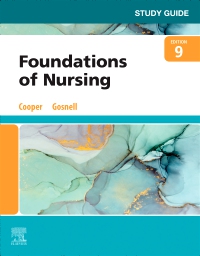
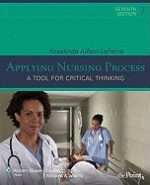
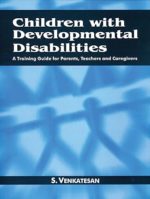
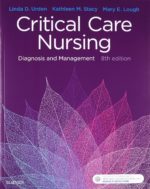
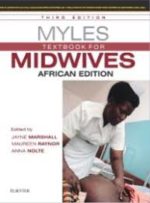
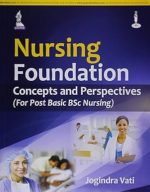
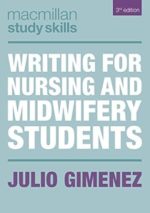
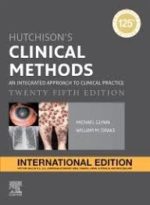
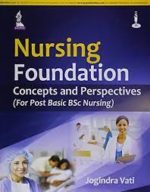
Be the first to review “Study Guide for Foundations of Nursing, 9th Edition”